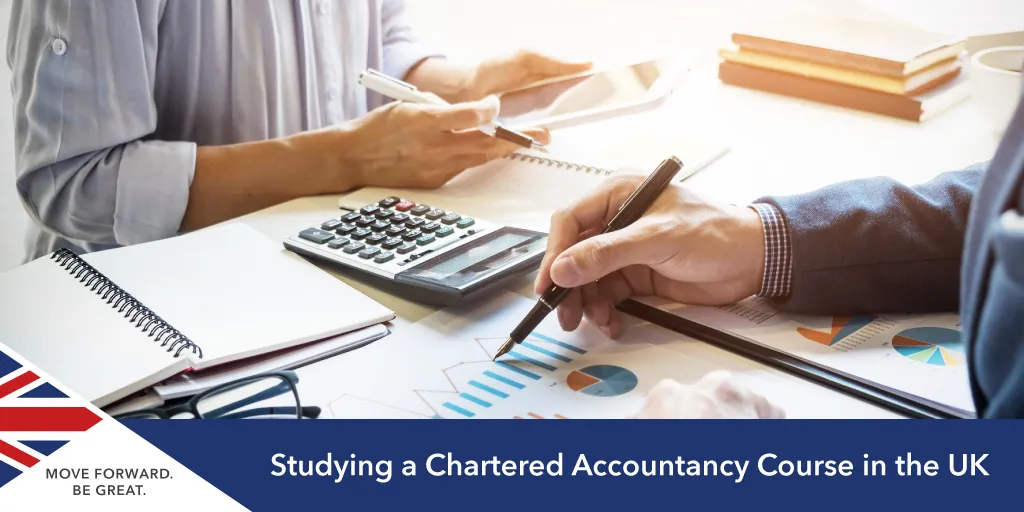A career in chartered accountancy offers unparalleled financial expertise, business acumen, and global recognition opportunities. As the financial landscape evolves, selecting the right university for your professional journey becomes crucial.

Top 10 UK Universities for Chartered Accountancy in the UK
In this comprehensive guide, we have curated a list of leading UK universities that provide exceptional programmes and resources to groom future chartered accountants. We delve into key factors such as academic reputation, faculty expertise, student support, professional affiliations, and career placement to help aspiring accountants make informed decisions.
1. London School of Economics
The BSc Accounting & Finance at LSE offers a comprehensive education encompassing core social sciences and practical applications. Beyond accounting and finance skills, students gain insights into institutional processes, accountability, risk, governance, and policy-making. The course fosters critical evaluation and adaptability of financial techniques in diverse contexts. LSE graduates are in high demand globally for roles in accounting, finance, and beyond, such as investment banking, management consultancy, and the public sector.
- Course to consider: BSc Accounting and Finance
- Entry requirements: A-levels* AAA with A in Mathematics. IB Diploma 38 points overall. 766 in higher level subjects, including 6 in higher level Mathematics
- International fees: £25,656
2. University of Warwick
Ranked 2nd in the UK by The Guardian University Guide 2023, the BSc Accounting & Finance programme at Warwick Business School is designed to equip you for a successful future career. Tailor your studies to focus on accounting, finance, or a combination of both, aligning with your career goals. This professionally-oriented qualification consistently ranks high in major UK league tables and empowers you with the skills and confidence to thrive in multinational companies and global financial markets.
- Course to consider: BSc Accounting & Finance
- Entry requirements: A levels: A*AA including A in Maths. International Baccalaureate: 38 overall, including at least 5 in Higher Level Maths.
- International fees: £29,830
3. University of Aberdeen
The Accountancy MA at Aberdeen provides a comprehensive foundation in theory, practice, and business skills taught by accounting experts. Real-life employers and scenarios are integrated into the curriculum. The course spans four years, covering essential topics such as accounting, finance, statistics, and business law. In the final year, advanced subjects include accountability, sustainability, audit theory, public sector accounting, and accounting history, offering students a well-rounded and industry-relevant education in the field of accountancy.
- Course to consider: Accountancy, MA
- Entry requirements: LEVELS Standard: BBB Minimum: BBC Adjusted: CCC. International Baccalaureate 32 points, including 5, 5, 5 at HL.
- International fees: £20,800
4. University of Edinburgh
The MA in Accounting and Finance at Edinburgh provides a unique blend of accounting and finance studies, equipping students to tackle contemporary business, government, and non-profit challenges. Led by renowned industry professionals and researchers, the curriculum fosters authentic leadership, ethical business behaviour, and effective communication. Graduates gain a diverse skill set applicable to various roles, including accountancy, finance, marketing, data analytics, and entrepreneurship. Accredited by prestigious organisations, this programme promises a well-rounded education in the dynamic world of accounting and finance.
- Course to consider: MA Accounting and Finance
- Entry requirements: SQA Highers: AAAAA (achievement by end of S5 preferred). BBB must be achieved in one year of S4-S5. A Levels: A*AA. IB: 39 points with 666 at HL.
- International fees: £24,500
5. University of Bath
On the Accounting and Finance BSc (Hons) at Bath University, undergraduate courses consist of compulsory units covering essential concepts and optional units for specialisation. Each academic year requires 60 credits split into 30 per semester, totalling 1200 notional study hours. Year 1 covers business, society, accounting, finance, economics, mathematics, and statistics. Year 2 includes intermediate accounting, company law, finance, and elective options. Year 3 offers flexibility with final-year options. Teaching and assessment methods vary to promote in-depth learning and understanding of the subjects.
- Course to consider: Accounting and Finance BSc (Hons)
- Entry requirements: A level Typical offers AAA or A*AB AAA or A*AB in three A levels, including A in Mathematics. International Baccalaureate Diploma 36 points overall and 6, 6, 6 or 7, 6, 5 in three Higher Level subjects, including 6 in either HL Mathematics.
- International fees: £23,500
6. University of Glasgow
The Finance BFin at Glasgow offers a structured curriculum, starting with foundational courses in finance, economics, accounting, and management in Year 1. In Year 2, specialisation in finance deepens with advanced courses in asset pricing, risk, financial markets, and financial modelling. Years 3 and 4 (Honors) present opportunities for core chartered accountant courses in advanced financial modelling and finance case studies alongside various optional courses.
- Course to consider: Finance BFin
- Entry requirements: ABBB is the minimum requirement from S5 to be reviewed for an S6 offer. A-level Standard Entry Requirements AAA – ABB. IB Standard Entry Requirements 38 (6,6,6 HL) – 32 (6,5,5 HL).
- International fees: £21,210*
7. Bangor University
The MSc in Accounting and Finance at Bangor University offers a comprehensive understanding of current financial and corporate developments and advanced theory and practice in accounting and finance. Designed for graduates and professionals with practical training, the programme equips individuals for senior-level careers in accounting, financial services, or related sectors. Students tackle issues such as financial account formulation, agency concerns, accounting theory's impact on practice, regulation's influence on firms, risk evaluation, international investment, portfolio management, and financial forecasting.
- Course to consider: MSc in Accounting and Finance
- Entry requirements: A good undergraduate degree (2ii) in a relevant subject, e.g. economics, finance, accounting or management from a university, or a similar qualification from any other institution.
- International fees: £16,000
8. Durham University
In Durham University's Accounting and Finance programme's first year, students cover essential modules in financial accounting, management accounting, ethics, economics, business law, taxation, and business technology. Year two delves into financial management, performance management, advanced taxation, financial reporting, and assurance. In the third year, students focus on research methods and undertake a dissertation on an accounting topic of their choice.
- Course to consider: BSc Accounting
- Entry requirements: A-level offer - AAB. IB score - 36 to include 665 in higher-level subjects.
- International fees: £31,500
9. University of Leeds
The MSc in Accounting and Finance at Leeds offers a comprehensive study of corporate finance, accounting's role in organisational performance, and quantitative data analysis. Advanced finance theories are applied to tackle complex financial problems. Research methods and their impact on current finance practices and topics like organisational performance and financial reporting are explored. Optional modules allow for specialised knowledge in behavioural finance and international banking.
- Course to consider: Accounting and Finance MSc
- Entry requirements: A bachelor's degree with a 2:1 (Hons) in a related subject.
- International fees: £31,500
10. University of Strathclyde
Accounting at Strathclyde offers a comprehensive curriculum covering accounting, finance, economics, and business analysis. In Years 2 and 3, students can specialise in another business discipline of their choice alongside accounting. The core accounting modules encompass financial reporting, management accounting, governance, taxation, auditing, and assurance. Year 4 (Honors) introduces advanced modules like sustainability accounting, management accounting theory, auditing theory, and accounting technologies.
- Course to consider: BA (Hons) Accounting
- Entry requirements: 1st sitting: AAAA/AAABB 2nd sitting: AAAABBB (English B, Maths A). International Baccalaureate 36 (no subject below 5 and including English SL5, Maths/Maths Studies HL5
- International fees: £17,400
Roles and Responsibilities of a Chartered Accountant
As a certified chartered accountant in the UK, your roles and responsibilities may vary based on your specialisation and industry. Common tasks include budget management, financial audits, providing financial advice, risk analysis, tax planning, maintaining accounting records, and advising clients on financial improvements. You will collaborate with clients, individuals, and companies, liaise with auditors, and prepare reports and recommendations after audits. Additionally, you will prepare financial statements and negotiate contracts with suppliers.
How to Become a Chartered Accountant in the UK?
To become a chartered accountant in the UK, follow these steps.
- Start your Training: Begin your apprenticeship after school, college, or after completing a relevant degree or business qualification.
- Study an Accredited Degree: Consider pursuing an accredited chartered accountant qualification in subjects like accounting or finance, supported by ICAEW, to gain relevant knowledge and skills and receive exemptions from some professional exams.
- Work for 3 Years to Gain Experience: Complete at least three years of on-the-job training while simultaneously taking professional exams.
- Pass Professional Exams: Successfully pass the professional exams conducted by the relevant accounting body (e.g., ICAEW, ICAS, CAI) to demonstrate your expertise in accounting principles and practices.
- Register with a Recognised Accounting Body: Upon successfully completing the exams and gaining the required practical experience, you can become a member of an accredited accounting body, such as ICAEW.
- Continue Professional Development: Stay updated with the latest developments in accounting practices through continuous professional development (CPD) and ongoing training.
- Specialise and Advance: Consider specialising in specific areas of accounting or finance, such as tax, auditing, or financial management, and pursue further qualifications or certifications to advance your career as a chartered accountant.
Why Study Chartered Accountancy in the UK?
Advantages of studying chartered accountancy in the UK:
- Professional Accreditation: Obtain recognition from renowned accounting bodies like ACCA, CIMA, ICAEW, or CPA.
- Time Efficiency: Complete your graduate degree one year earlier than in other countries.
- Real-World Experience: Gain practical knowledge through decision-making scenarios in company settings.
- Networking Opportunities: Build a strong global accounting and finance professional network.
- Diverse Specialisations: Choose from various accounting programmes to match your career goals.
- Global Recognition: UK accounting qualifications are highly respected worldwide, offering international career opportunities.
FAQ
Which degree is best for chartered accountants?
A degree in accounting or finance is typically the most suitable choice for aspiring chartered accountants. However, other related business, economics, or commerce degrees can also provide a solid foundation. The key is to ensure that the chosen degree programme aligns with the curriculum and requirements set by the relevant professional accounting body in the country where one intends to pursue the chartered accountant qualification.
How do I become a chartered accountant?
To become a chartered accountant, one must typically complete a recognised professional qualification from a relevant accounting body or institute. The pathway may involve completing a degree in accounting or a related field, then undertaking specific professional exams and obtaining practical work experience under the guidance of a qualified mentor. After completing the required exams and meeting the experience criteria, candidates can apply for membership with the accounting institute and earn the designation of a chartered accountant.
What does a chartered accountant earn in the UK?
A chartered accountant's salary in the UK varies depending on experience, location, sector, and the employer's size. On average, a newly qualified chartered accountant can earn around £30,000 to £45,000 per year. As experience increases, salaries can range from £50,000 to £100,000 or more, especially for those in senior management or partner positions within accounting firms or corporations.
What is the highest level of accounting?
In the UK, the highest level of accounting designation is the Chartered Accountant (CA). The CA qualification is offered by various professional accounting bodies, such as the Institute of Chartered Accountants in England and Wales (ICAEW), the Institute of Chartered Accountants of Scotland (ICAS), and the Chartered Accountants Ireland (CAI).
What is the difference between an accountant and a CA?
An accountant is a generic term for someone who handles financial data, record-keeping, and financial analysis. On the other hand, a CA (Chartered Accountant) is a specific professional designation awarded by an accredited accounting body after completing a rigorous qualification process, including exams and work experience. CAs typically possess a deeper understanding of financial regulations, tax laws, and auditing standards, making them more specialised and sought after in various accounting and financial roles. While all CAs are accountants, not all accountants hold the prestigious CA designation.












 I sincerely thank SI-UK for getting me accepted to UCL. The MSc in Urban Development and Planning is extremely competitive, but the right guidance provided by SI-UK made my dream of studying at University College London a reality. The services were exceptional from beginning to end.
I sincerely thank SI-UK for getting me accepted to UCL. The MSc in Urban Development and Planning is extremely competitive, but the right guidance provided by SI-UK made my dream of studying at University College London a reality. The services were exceptional from beginning to end. 

